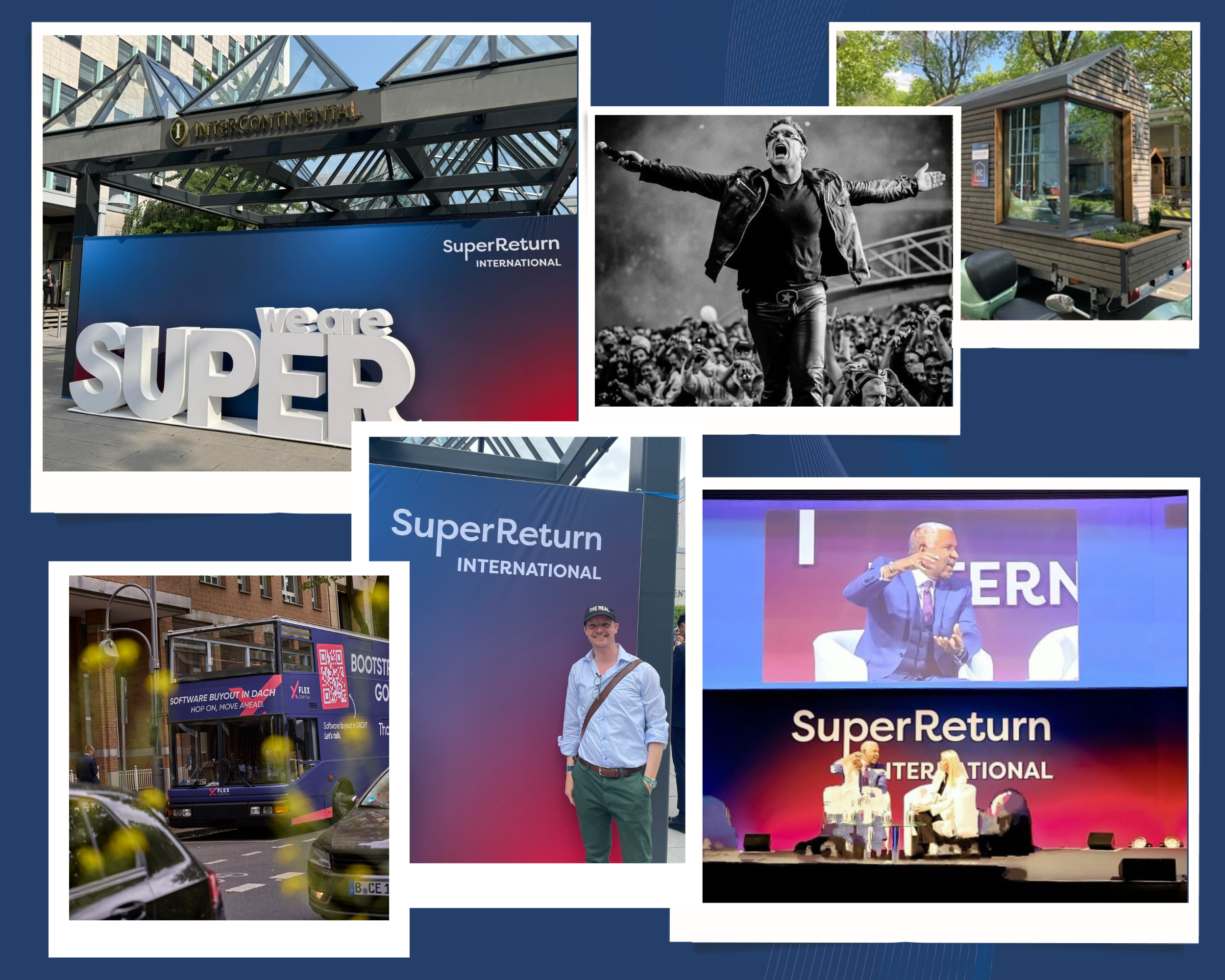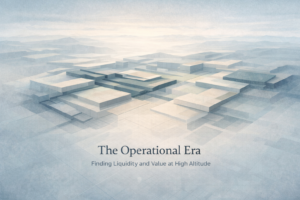Navigating Private Markets in Times of Uncertainty
Insights from SuperReturn International Berlin
“Private markets aren’t immune to uncertainty; they’re shaped by how effectively we respond to it.”
Serena Williams, Venture Investor, Serena Ventures
From 2–6 June 2025, I attended the SuperReturn conference in Berlin at the InterContinental and several other venues on Budapester Strasse.
Here are my five key takeaways
- Liquidity remains the top priority. LPs and GPs alike are acutely focused on exit channels and distributions
- GP-led continuation vehicles are mainstreaming, even as critics warn about complexity and conflicts
- Geopolitical tailwinds are shaping strategy, particularly in Europe, where defence and security infrastructure are gaining traction
- Elevated infrastructure and private-debt commitments suggest investors are positioning for long-term upside despite headwinds
- SuperReturn Berlin has reached a tipping point
Despite the eyewatering cost of attending SuperReturn Berlin it is unrivalled in Europe and a must attend for many private market participants. It is part professional event, part the social event of the year in private markets, and part street parade.
If you are in the industry, it is hard, bordering on impossible to avoid. But it is in my opinion becoming more circus and less a serious industry event. Add to this the poor logistics and atrocious tech, which the organizers strive hard to make everyone captive to, and it is no wonder that participants are grumbling.
SuperReturn Berlin 2025 – Part Professional, Part Social, Part Street Parade

“Monoline” Socks are Back – Risk Off?
As always, I am keeping an eye on what I think may be a leading private markets sentiment indicator– socks!
Over the past two years at multiple conferences throughout Europe I have seen socks go from the multi-coloured striped variations with (too) short pants to solid two-coloured variants, and now it seems the more sombre black and navy are back.
Last year’s must have accessory “white sneakers” also seems to be out. Most are now again opting for dress shoes, and we even saw a few people, both inside and outside the venue, sporting ties with full Windsor knots.
Too early and too few data points to know for sure, but this seems to match the somewhat more sombre mood of this year’s SR Berlin.
Wall-to-Wall with Delegates
The conference supposedly had over 1,800 LPs managing more than USD 50 trillion, 2,700 GPs, and 5,500 senior decision-makers, all from over 70 countries.
Beyond official attendees, many industry professionals attended independently on the sidelines, organising coffee meetings where possible and attending many of the various networking events, contributing to the bustling energy of the conference.
Overall SR Berlin provided extensive insights into the state and future direction of private markets.
The SuperReturn Social Circuit – Not to be Missed Networking
SR Berlin is not just a conference, it is, as mentioned above, the social event of the year, where stars from outside the industry come to pay homage to the industry.
This year was no exception with the main draw being a rare guest speaker, Bono, who joined TPG on stage to discuss a decade of impact investing. His presence alone shifted the room’s energy, reminding attendees that private markets now intersect with cultural influence – and that Impact is serious business.
The conference sprawled far beyond the InterCon: coffee pitches at Starbucks, meetings and lounge music along Budapester Strasse, and networking in any side-street venue that was in comfortable walking distance from the InterCon
Evening events spanned from drinks by the Spree, over exclusive dinners, featuring at least one ex-Prime Minister to a bash Monkey Bar dinner. Elsewhere Mel C was spinning records at a ‘White Party’ and at yet another exclusive event Snow Patrol’s were playing. All underlining how the industry’s informal moments often drive the most valuable connections.
The event is now so big and spread out over multiple locations that it is not possible to cover fully, but here are my observations and takeaways.
What Do LPs Think?
LPs remain concerned about distributions and liquidity, given ongoing geopolitical tensions and economic volatility. Throughout SuperReturn, conversations reflected cautious optimism tempered with realism – the mood among LPs, and to some extent GPs, could be described as sombre.
LPs emphasised the need for GPs to transparently articulate their strategies for managing distributions and ensuring liquidity events or successful secondary transactions.
One particular on point comment from an LP summed it up perfectly:
“We take it tweet by tweet”
The phrase encapsulates the industry’s wary approach to navigating the unpredictable impacts of geopolitical developments such as US-China trade conflicts, tariff wars, wars, potential US rate increases prompted by deficit concerns, and ongoing legislative uncertainties.
LP Concerns: Liquidity and Distributions
Liquidity was a dominant theme across multiple discussions. GPs are increasingly relying on the secondary market to address liquidity issues. Nearly USD 140 billion transacted in 2024 alone and most market participants expect 2025 to dwarf that.
The sentiment was clear: despite booming secondary markets, most fundraises, portfolios, and liquidity plans face significant challenges.
Nevertheless, there was some optimism about Europe’s growing investment opportunities, described by some participants as an awakening of the industry’s “animal spirits” I.e. the ability of the industry to continuously reinvent itself.
Where Are LPs Committing?
LPs expressed a clear preference for asset classes with robust fundamentals particularly those capable of weathering economic uncertainty.
Infrastructure investments were singled out due to their predictability and stable cash flows. This preference was reflected in increased commitments to infrastructure-focused funds from leading managers like Brookfield, Global Infrastructure Partners / Blackrock, KKR, as well as more specialized managers such as Copenhagen Infrastructure Partners.
Private debt was also notably popular among LPs, appealing due to its potential for attractive yields amidst a high-interest-rate environment.
Discussions indicated a general agreement that, despite economic challenges, these asset classes offer strategic protection and potential growth for LP portfolios.
Continuation Vehicles and Secondaries: New Norms
Continuation vehicles (CVs) emerged prominently in many discussions. Historically viewed sceptically, CVs, even if LPs remain critical, are now mainstream, acting as critical tools for GPs to navigate challenging market conditions.
They provide valuable liquidity options for LPs, allowing GPs to extend the lifespan of assets, manage market volatility, avoid unfavourable exits, and possibly hang on to so-called “trophy” assets.
However, concerns remain about potential conflicts of interest, complex valuations, and regulatory scrutiny. See also our prior post on CVs: “The Attraction and Trouble With Continuation Vehicles for LPs – Part 1” and “Part 2”
Participants humorously coined the phrase “CVs cubed” to describe the growing complexity and layered nature of these transactions, highlighting their increasing prevalence in private market strategies.
I wish I had thought of “CVs cubed” for my posts on CVs. To my mind this neatly captures both the complexity of CVs as well as the cynicism that those who remember “CDOs Squared” are attaching to them. Hopefully today’s investors are more cautious about the complexity of this.
Geopolitics and Defence: The New Investment Frontier
Geopolitics was not an unexpected main and very consistent theme, underscored by discussions about defence and security.
The urgent need to digitalise Europe’s security infrastructure, which spans much wider than simply “guns & bullets” was identified as a significant opportunity for private equity.
With dedicated pools of capital emerging specifically for defence technology and infrastructure, the sector was humorously termed “defence is the new sexy” given its rising appeal. In fact, so much so that having been in the proverbial doghouse for at least a decade, it is now seen ESG mainstream.
A future post digs deeper into Defence but, in the meantime, you can catch and insightful podcast with Thomas Friedberger from Tikehau Capital on Balentic Edge –“Inside Tikehau Capital’s Aerospace & Defence Strategy”
SuperReturn: Breaking Point?
SuperReturn’s rapid expansion, now spanning multiple venues as well as a good chunk of Budapester Strasse, did create debate about whether it has outgrown itself.
Notably, this year, anti-capitalist protests erupted outside the InterContinental, requiring unwanted and very in-your-face presence of German riot police – fortunately there was no injury or damage.
Inside, attendees faced long queues for everything from coffee and lunch to restrooms and drinks – a symptom of the conference having massively outgrown the InterContinental and massively outpaced logistics.
Compounding frustrations were guest‑pass inefficiencies, which delayed meetings as unofficial participants had to be picked up by official participants and shuttled in and out via crowded elevators. Security, checking badges, were polite but aggressively patrolling people who strayed in search of a toilet or trying to find the people they were meant to meet.
The Private Markets Trailer Park
Meanwhile, Budapester Strasse was lined with buses, RVs, and caravans. In the case of the latter, reportedly having to rent extra chairs for EUR 1,000. Had you asked me even three years ago, I would not have expected some of the most blue-chippy of the blue chips to be camped out in trailers. But, arguably it works, and it does save you the queues at the InterCon.
The Greek restaurant across from the InterCon was this year formally enrolled as an offsite venue. Now a table for all five days (you cannot get less) costs EUR 8,000 up from EUR 200 per day last year – lunch not included.
With prices ballooning on everything, the organisers, adding insult to injury, supposedly wrote to both LPs and GPs encouraging / instructing them to only hold meetings at officially sanctioned locations.
What stood out most, however was the unusual choice to advertise to the public. Many questioned the logic of publicly promoting at various places in Berlin an event inherently private by nature, particularly given the industry’s preference for discretion and the risks of drawing unwanted attention, no one attending are keen on picket lines and riot police.
Broader Investment Themes
GPs see generational opportunities emerging in Europe, supported by lower valuations, monetary and fiscal stimulus, and increased defence spending, which some estimates indicate could reach 5% of economic output.
Additionally, the MENA region is experiencing growing influence, driven by robust capital inflows and a virtuous cycle of reinvestment.
Sports investment also gained significant attention, with panels exploring this emerging asset class in-depth, notably featuring insights from EY’s Private Equity Sports team led by Stefan Mohr and Simon Mantell.
Investors also identified increasing opportunities in data centres, digital grids, and real estate, reflecting a growing appetite for stable, infrastructure-like investments.
Energy Transition is a Significant Opportunity
AI’s rise was another key theme, which alongside the Green Transition and Energy Security, underscores the urgent demand for infrastructure transformation.
Europe alone may require over USD 1 trillion to modernise its power infrastructure to meet the demands driven by AI technologies.
Investors agreed on the critical importance of rigorous value creation efforts, particularly through AI integration, to achieve desirable returns.
For those wanting a bit more input on Energy Transition, see this post “Energy Transition – a multi-trillion dollar investment opportunity for private markets“
Conclusion: Cautious Optimism and Strategic Actions
SuperReturn reaffirmed the resilience and adaptability of private equity despite persistent challenges. Industry optimism remains cautiously buoyant, driven by a strategic focus on selective offence and innovation.
These elements, coupled with strong industry fundamentals and creative liquidity solutions, position private equity and private markets in general well for the uncertain yet opportunity-rich landscape ahead.
Stay Illiquid
Kasper
More Insights
Balentic Edge
Sign up to keep up to date with the latest news and updates.
© 2025 Balentic ApS. CVR: 44034255. All rights reserved.
Privacy Policy | Terms of Service
The Balentic website and Orca are, and are expected to continue to be, under development. Consequently, some of the features described in this Overview and/or on the website may not yet be available or may work differently. Some features may furthermore not be available to all users.


